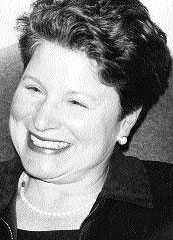 |
 |
|||||
 |
 |
 |
 |
|
Leader’s calling: giving support to lay ministers
Catholic New World staff writer Michelle Martin talks with Keiren O’Kelly. When Keiren O’Kelly took over the Office for Lay Ecclesial Ministry in March, she came to the job with some experience: more than five years as pastoral associate at her home parish of St. Barnabas. In her new position, she hopes to continue the support the office provides to the archdiocese’s pastoral associates— who have master’s degrees in theology or ministry and have gone through the archdiocesan certification process—and also reach out to other lay pastoral ministers.
The Catholic New World: How did you become a pastoral associate? Keiren O’Kelly: I had always been interested in theology—my undergraduate major was theology—and as a graduate student, I thought ministry might be the better direction to go in. My first job was at Catholic Theological Union in Chicago, working in admissions and recruitment.
TCNW: What do pastoral associates do? KO: A pastoral associate is designed to be a generalist, who can handle any tasks the pastor might delegate to them. In that way, a pastoral associate is like an associate pastor. In a given parish, the pastor might delegate to you all kinds of tasks. A lot of them do RCIA (Rite of Christian Initiation for Adults), adult formation programs, some do liturgy, some of the others do Bible study, or funeral planning and bereavement ministry. They need to be prepared to be plugged into the needs of the community. Some are doing asbestos removal and noise abatement. It really depends on what the pastor wants to delegate, and the interests and desires of the pastoral associate.
TCNW: How many are there? KO: There are 173 certified pastoral associates and pastoral ministers that our office works with. The difference is that pastoral associates come through the certification process with a master’s degree in divinity or theology or its equivalent—some might have a master’s in something else and have deacon formation, for instance. A pastoral minister is someone who’s not a generalist, maybe a minister of care or someone who does family formation, and doesn’t necessarily have a degree in it.
TCNW: How does this office support lay pastoral workers and their parishes? KO: This office is responsible for placement services, not just for pastoral associates. It could really be for anyone—business managers, secretaries, temps, directors of religious education. We post all the openings on the Web, and any pastor can give us a posting. We also do some counseling and guidance for people who are thinking about going into this area. Maybe they have been a committed volunteer, and are thinking about a career change, and they want to know what it would entail. We also are responsible for the certification of pastoral associates.
TCNW: Is the certification specific to this archdiocese, or is it something that would apply across diocesan lines? KO: There is no portability of certification or titles across diocesan lines. For example, the Archdiocese of Indianapolis might not recognize me as a pastoral associate. But in some rural areas, they might have pastoral associates that don’t have the degrees or the education, because there’s no place for people to go. Chicago is unusual in that it has two Catholic graduate schools of theology (Catholic Theological Union and Loyola University Chicago’s Institute for Pastoral Studies).
TCNW: How and when did the movement towards more lay ministers in parish positions get started? KO: It’s been happening gradually since the mid-1980s. In the mid-1980s, there were many men and women, particularly religious women, who were being asked to serve as directors of religious education. Then those jobs expanded a bit as the pastors asked them to do more things, and they flexed to meet the needs of the parish staff.
TCNW: How have pastoral associates been welcomed by parishes? KO: I think you’ll find in ministry in general, no matter who you are, that people will wait to find out what you’re about before they give you authority. People want to know that you’re a committed Catholic Christian, and that your agenda is the church and the church’s mission in the world. People who are ordained probably have a head start because they feel they already know something about you. Acceptance will depend on whether that is the agenda of the people. If you are going to lead them in the direction they are already going, it’s not so difficult. Where the Spirit is in this is that there are so many fine people who are willing to make the commitment to do this work, often for less than they would be able to make in the private sector, because not-for-profits never pay as well. Parishes are very labor intensive.
TCNW: Is the increasing reliance on lay ministers good for the church? KO: It’s always good when you call forth a Christian’s gifts for the mission of the church in the world, and this is a variation on that. Whether it’s in a parish or not, you’re still working for the mission of the church. What is key to the future of the church is that people in the leadership of the community have a firm grasp of what the tradition is. If you don’t have that, you’ll lose it all. And you can’t be informed about the tradition if you haven’t opened the book.
The Pastoral Associates of the Archdiocese of Chicago will hold their 20th anniversary luncheon May 7 at the Drury Lane in Oakbrook Terrace. For registration information, call Sister Eileen Tierney at (773) 586-1223.
Front Page | Digest | Cardinal | Interview | |
||||||||
